What AR verbs in Spanish?
AR verbs in Spanish are verbs which end in the letters -ar in the infinitive form, such as hablar (to speak), trabajar (to work) and mirar (to watch, look at). This post will cover both regular and irregular Spanish AR verbs in detail.
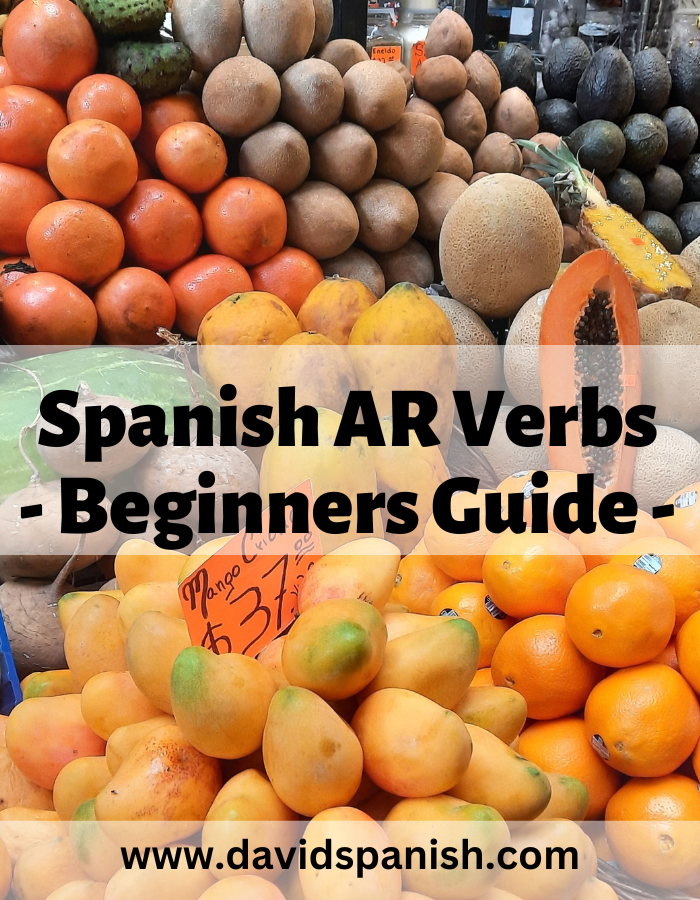
Spanish regular vs. irregular AR verbs explained
If you’re learning Spanish, you’ll encounter the terms “regular” and “irregular” verbs. What do these terms mean?
Essentially, the language classifies verbs in to three groups or categories: AR, IR and ER.
AR, IR and ER are the last two letters of the verb in the infinitive or mother form. For example, hablar (to speak) is an AR verb.
More specifically, hablar is a regular AR verb. This is because 1) When conjugated in the present tense, its endings follow the exact same pattern as all of the other regular AR verbs and 2) there are no changes in its stem.
Examples of irregular AR verbs are estar (to be) and pensar (to think). Estar is irregular because an -y is added to the yo (I) form and an accent is added over the á in the tu, él and ellos forms.
Pensar is irregular because of a spelling change which occurs in verb stem in the yo, tú, él and ellos forms.
The following graphic summarizes my point.
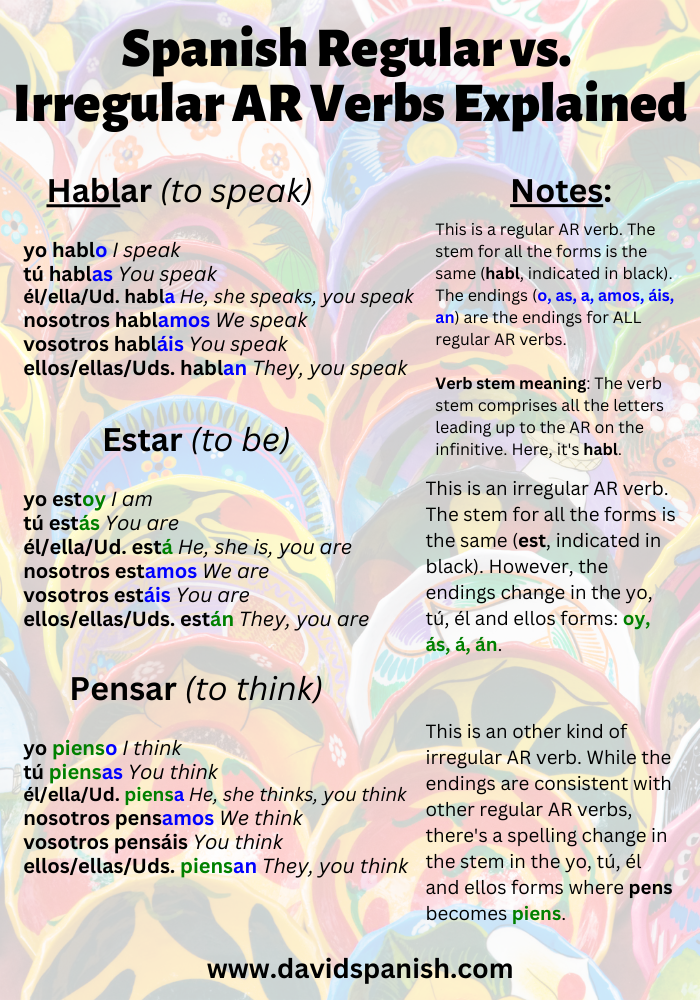
Conjugations For The Most Common Spanish regular AR verbs
In this next section we’ll look a list of the most common regular AR verbs in Spanish. We’ll present all verbs in two verb tenses: The present tense and the preterite, a commonly used Spanish past tense.
In the present tense, yo hablo, translates to “I speak” and “I am speaking”. I the preterite, yo hablé translates to “I spoke”.
Hablar – to speak
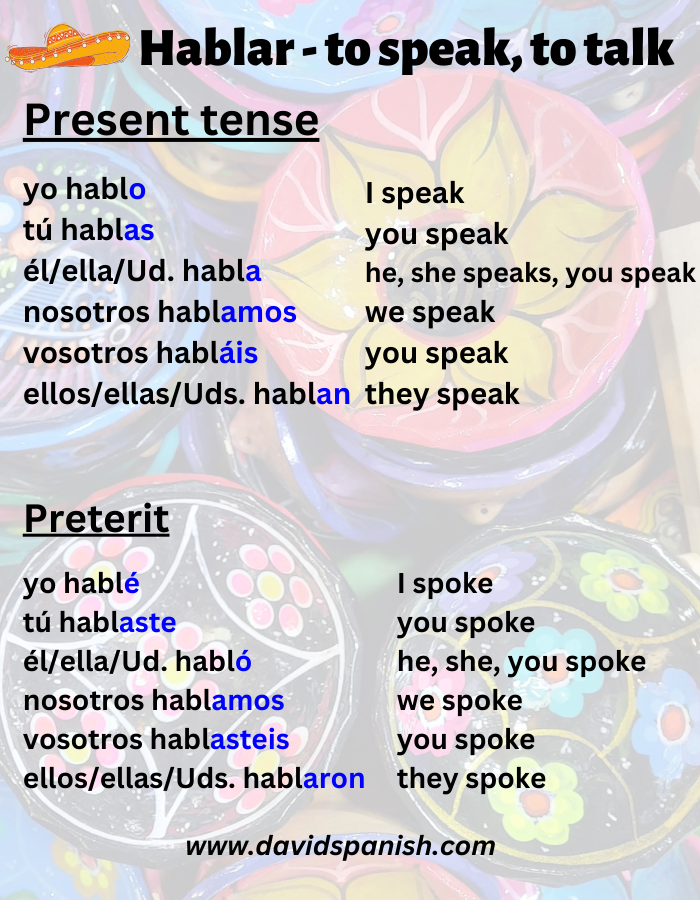
Example sentences:
- Yo hablo español. I speak Spanish.
- Ella habla portugués. She speaks Portuguese.
- Por qué no hablaste con tu mamá? Why didn’t you speak with your mom?
- Nosotros hablamos ayer. We spoke yesterday.
Comprar – to buy
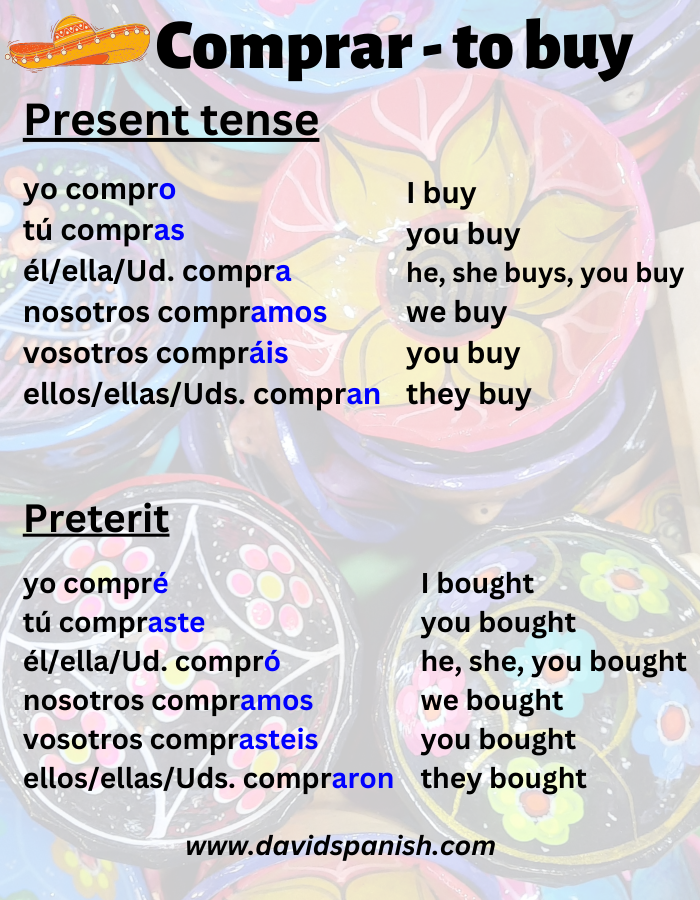
Example sentences:
- Compro el nuevo carro. I’m buying the new car.
- Compran las guitarras. They’re buying the guitars.
- ¿Compraste la casa? Did you buy the house?
- ¿Por que compraron los libros? Why did they buy the books?
Trabajar to work
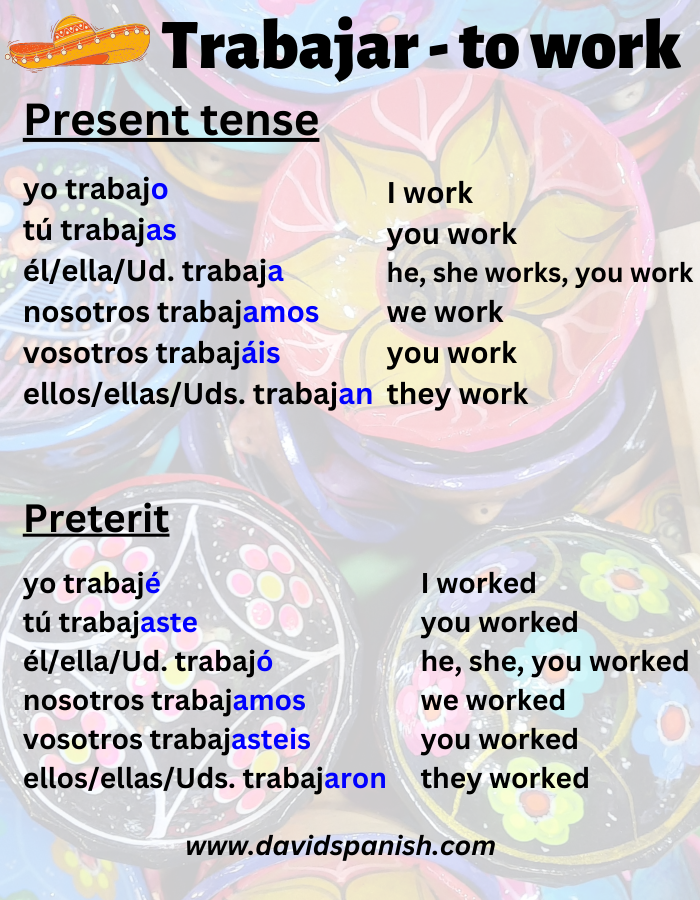
Example sentences:
- Hoy no trabajo. I’m not working today.
- ¿Trabajas mañana? Are you working tomorrow?
- ¿Trabajaste con Pablo? Did you work with Pablo?
- No trabajé ayer. I didn’t work yesterday.
Mirar to watch, look at
Translation for mirar include to watch, look at and to gaze.
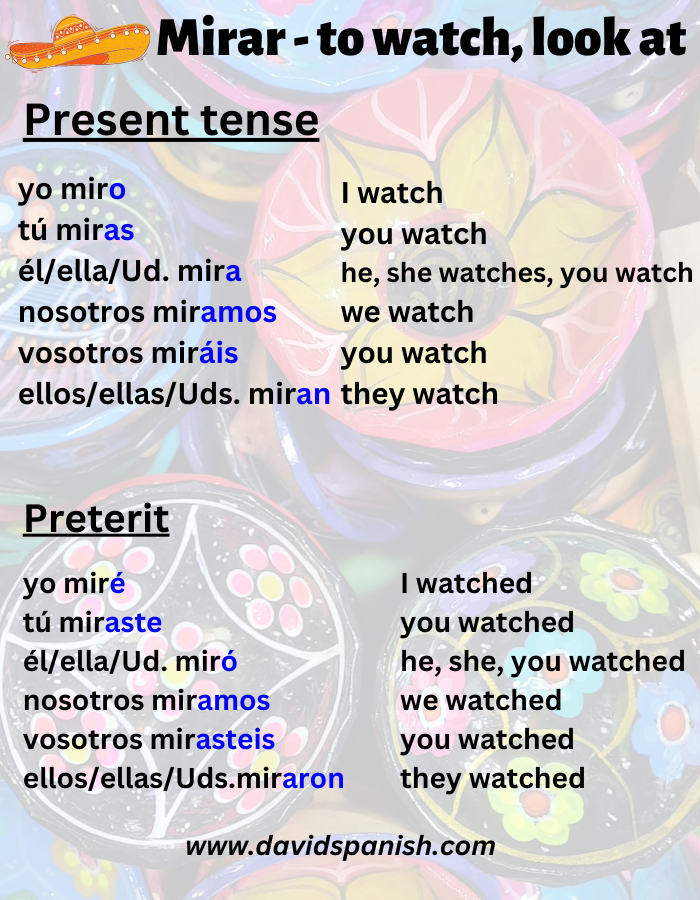
Example sentences:
- Esta noche yo miro la televisión. I watch TV tonight.
- Tu miras los cuadros. You look at the paintings.
- Usted miró la pelicula. You watched the movie.
- Ayer Miraron la televisión. They watched TV yesterday.
Tomar to take
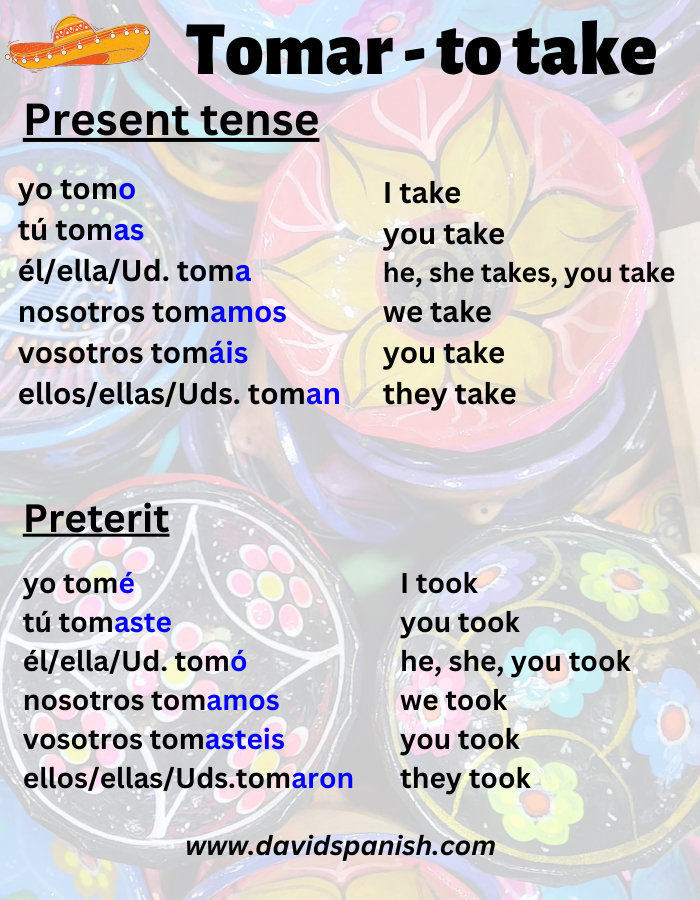
Example sentences:
- Yo tomo un baño. I take a bath.
- Tu tomas una ducha. You take a shower.
- Usted tomó un café. You had a coffee.
- Tomaron el autobus. They took the bus.
Estudiar

Example sentences:
- Yo estudio en la universidad. I study at the university.
- Tu estudias francés. You study French.
- Ustedes estudiaron alemán. You studied German.
- Ella estudió en los Estados Unidos. She studied in the United States.
Escuchar to listen
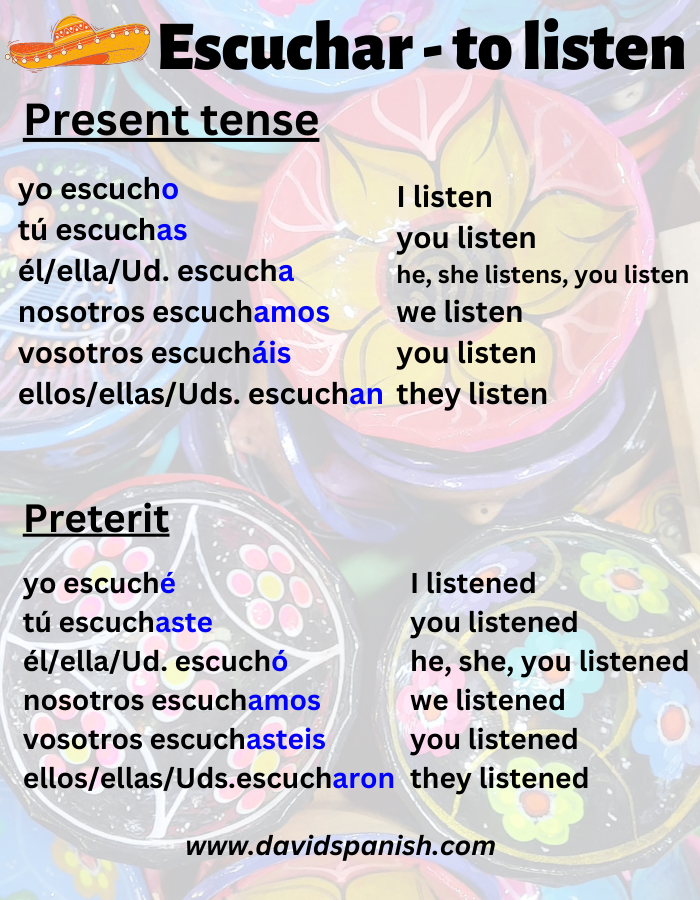
Example sentences:
- Yo escucho la musica. I listen to the music.
- Tu escuchas mi voz. You listen to my voice.
- Nosotros escuchamos el anuncio. We listened to the announcement.
- Ellos escucharon las instrucciones. They listened to the instructions.
Viajar to travel
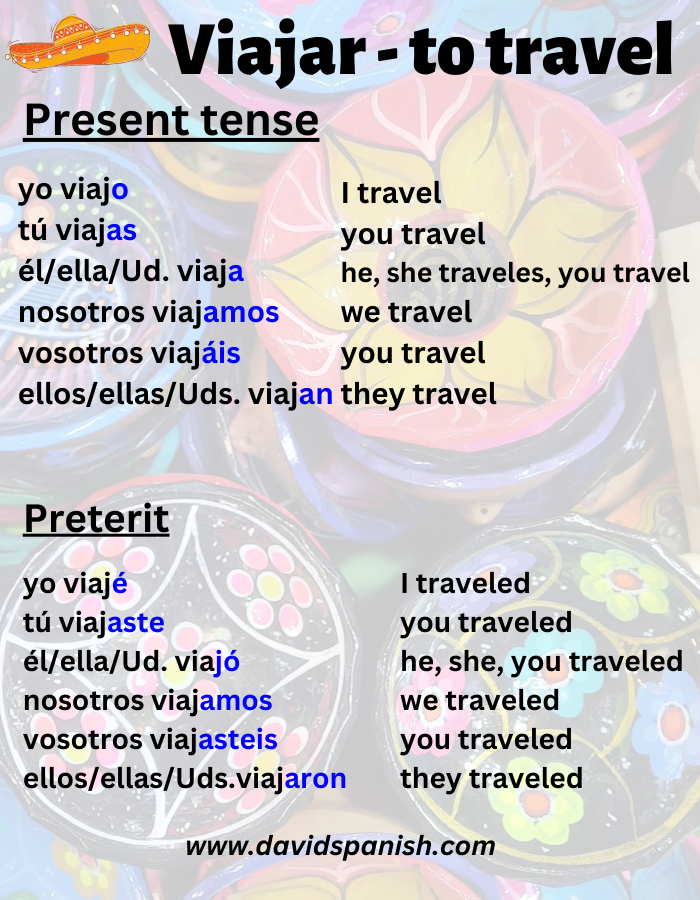
Example sentences:
- Yo viajo en México. I travel in Mexico.
- Él viaja con su familia. He travels with his family.
- Usted viajó en Europa. You traveled in Europe.
- Ellos viajaron juntos. They traveled together.
Cocinar to cook
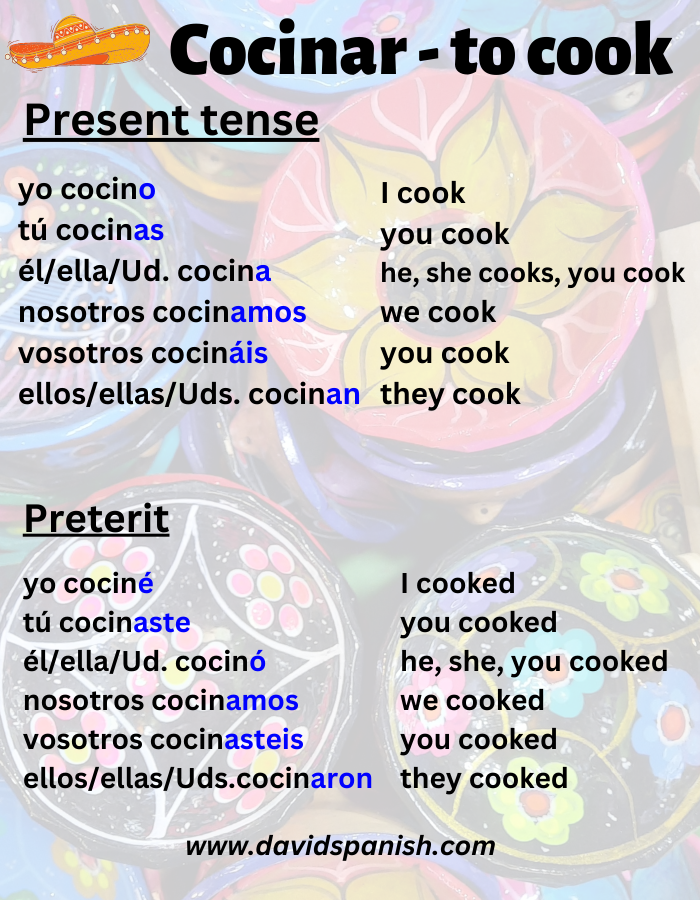
Example sentences:
- Yo cocino la comida. I cook the meal/food.
- Mamá cocina la cena. Mom cooks dinner
- ¿Qué cocinó por los invitados? What did you cook for the guests?
- Ellos cocinaron el pollo con mole. They cooked chicken mole.
Preparar to prepare
Note that translations of the verb preparar include to prepare and to make.
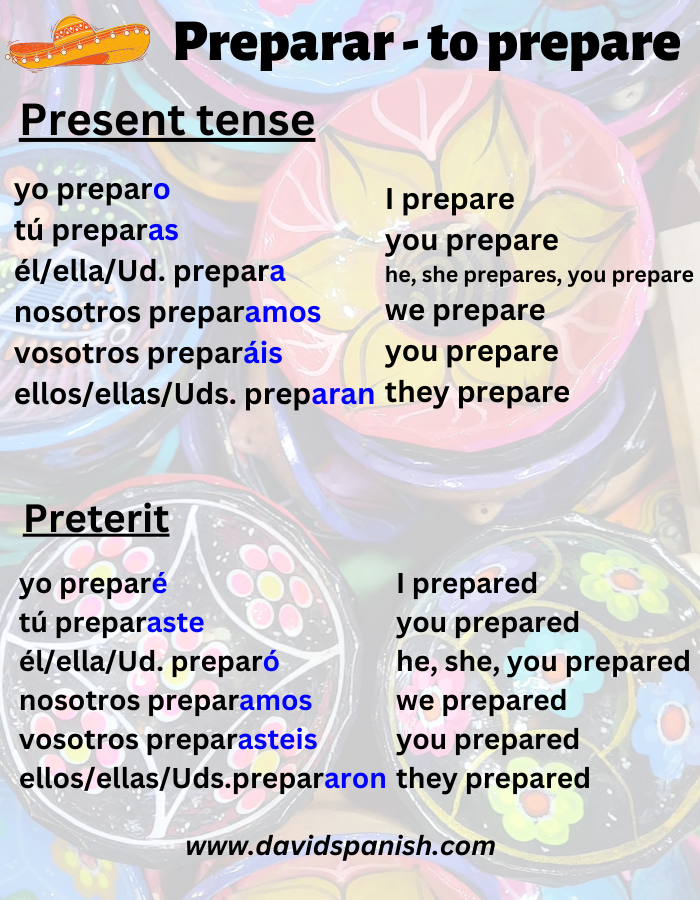
- Yo preparo las bebidas. I make the drinks.
- Ella prepara la cena. She makes dinner.
- Usted preparó el desayuno. You made breakfast.
- Ellos preparon el almuerzo. They made lunch.
Llegar to arrive
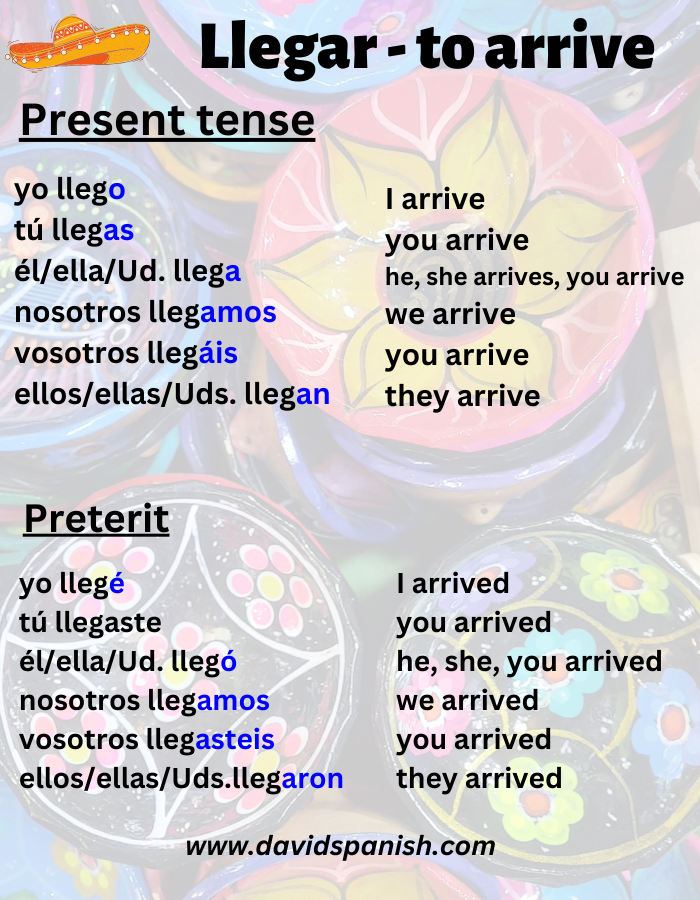
Example sentences:
Translations for the verb llegar include to arrive, reach or to get to.
- Llego en México manana. I arrive in México tomorrow.
- ¿Cuándo lleagas? When are you arriving?
- El tren llegó a Barcelona. The train arrived in Barcelona.
- Todavía no llegaron. They still haven’t arrived.
Spanish irregular AR Verbs
E -> ie verbs
Pensar to think
Pensar (to think) is an irregular AR verb because the -e becomes an -ie in the yo, tú, el/ella/Usted and ellos/ellas/Ustedes forms in the present tense.
Several other commonly used AR verbs follow this pattern including: apretar (to squeeze), cerrar (to close), comenzar (to start), confesar (to confess), despertar(se), to wake, to wake up, empezar (to begin), quebrar (to break), recomendar (to recommend) and sentar(se) (to sit).

Example sentences:
- Pienso salir esta tarde. I’m thinking about going out this afternoon.
- ¿Qué piensas hacer? What are you thinking of doing?
O -> ue verbs
Jugar to play
Jugar (to play) is an irregular AR verb because the -o becomes an -ue in the yo, tú, el/ella/Usted and ellos/ellas/Ustedes forms in the present tense.
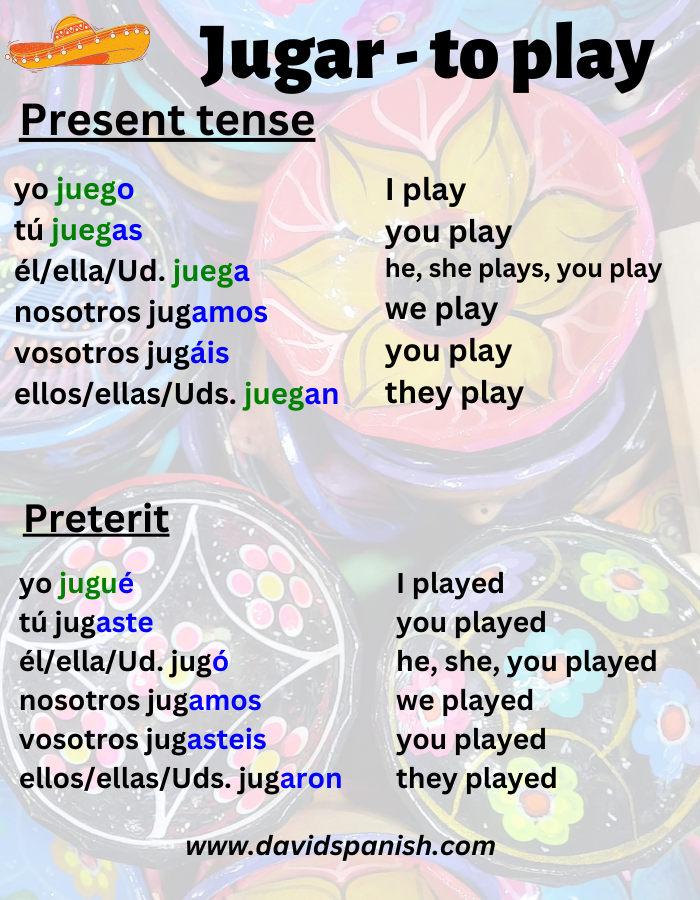
Example sentences:
- ¿A qué juegan? What are they playing?
- Juegan al fútbol. They’re playing soccer.
Several other common AR verbs followed this conjugation pattern including: acordarse (to remember), acostar(se), to put/go to bed, almorzar (to eat lunch), costar (to cost), demostrar (to show), encontrar (to find), mostrar (to show), probar(se), to try, to taste or to try on, recordar (to remember), rogar (to beg) and volar (to fly).
List of Spanish AR verbs
The following is a more complete list of Spanish AR verbs:
- acabar to finish
- aceptar to accept
- acompañar to accompany, go with
- aconsejar to advise
- aguantar to put up with, tolerate, stand
- ahorrar to save (money)
- alcanzar to reach, overtake
- almacenar to store
- alquilar to rent
- analizar to analyze
- apagar to turn/shut off
- aparcar to park
- armar to set up, put together
- arrastrar to drag
- arreglar to fix up, arrange
- aumentar to increase
- averiguar to find find out
- avisar to let know, notify, tell
- ayudar to help
- bailar to dance
- bajar to go down, lower, turn down, download
- besar to kiss
- brindar to toast
- buscar to look for
- cambiar to change
- caminar to walk
- cantar to sing
- cargar to load, to upload
- celebrar to celebrate
- cenar to have dinner
- cobrar to charge (money)
- cocinar to cook
- colocar to put, place
- comparar to buy
- contestar to answer
- conversar to talk
- cortar to cut
- crear to create
- cruzar to cross, to go through to traverse
- cursar to take a class or course
- dejar to let, to leave
- desarrollar to develop
- desayunar to have breakfast
- descansar to rest
- descargar to download
- desear to want
- dibujar to draw
- diseñar to design
- disfrutar to enjoy
- doblar to fold (paper, cloth), to dub (movie)
- durar to last
- echar to throw
- empujar to push
- encargar to ask, order, request
- ensayar to try, to test
- enseñar to teach
- entrar to come/go in, to enter
- entregar to hand over
- escanear to scan
- escuchar to listen
- esperar to hope, to wait, expect
- estacionar to park
- explicar to explain
- estudiar to study
- felicitar to congratulate
- firmar to sign
- funcionar to work, function
- ganar to win, to earn
- grabar to record
- gritar to shout
- guardar to keep
- hablar to speak, talk
- invitar to invite
- llamar to call
- llegar to arrive
- llevar to carry, to wear
- limpear to clean
- llorar to cry
- luchar to fight
- mandar to order to send
- manejar to drive
- marcar to dial, to mark
- mascar to chew
- mirar to watch, look at
- nadar to swim
- necesitar to need
- pagar to pay
- parar to stop
- patinar to skate
- pegar to stick, hit, glue
- pintar to paint
- pisar to step on
- planear to plan
- practicar to practice
- preguntar to ask
- preparar to prepare
- presentar to present, to introduce
- plusar to press (button)
- quitar to take away, remove
- regresar to come back, return
- repasar to review
- sacar to take out
- saludar to greet, to say hello
- telefonear to telephone
- terminar to finish, to end
- tirar to throw
- tocar to touch, play a musical instrument
- tomar to take, have a drink
- trabajar to work
- trotar to job
- usar to use, wear
- utilizar to use, utilize
- viajar to travel
- visitar to visit
- La Bamba Meaning, Spanish Lyrics & English Translation - May 4, 2024
- Bésame Mucho Meaning, Spanish Lyrics & English Translation - May 3, 2024
- Querida – Lyrics, Meaning & Translation - May 2, 2024
